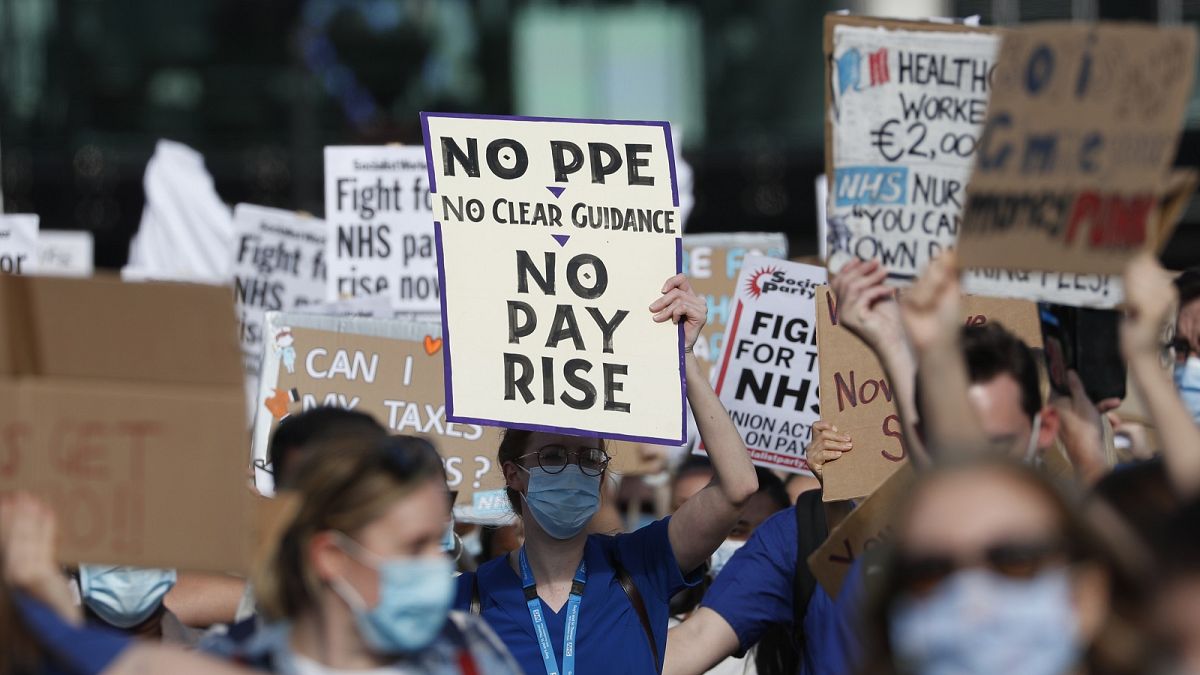The news that UK nurses will not be benefiting from a pay rise has angered many across the profession, one which has lost members to coronavirus and continues to fight the pandemic on the frontlines.
British Chancellor of the Exchequer Rishi Sunak announced a pay rise for almost 900,000 public sector workers across the country earlier this month to recognise their efforts during the coronavirus pandemic. Teachers, doctors, police officers and members of the armed forces are set to benefit from a pay increase, yet nurses and other allied healthcare professionals will not be rewarded by the Chancellor. As the biggest workforce in the health sector, nurses have been working tirelessly on the front line during the pandemic; some have sadly lost their lives as a consequence.
The news that nurses will not be benefiting from a pay rise has angered many across the profession. Whilst the government has defended its decision, using a 2018 pay increase as grounds to exclude nurses from this latest pay rise package, the announcement could be the final straw for an already demoralised and exhausted workforce.
Pay for nurses has been a political hot potato for years, but the pressure on the government to address this issue has certainly amplified more recently. According to the Royal College of Nursing, there are currently 40,000 nursing vacancies, against a backdrop of a year-on-year haemorrhaging of NHS nurses turning to the private health sector, moving abroad, or other professions entirely, for better pay.
In 2018, a three-year pay rise deal was struck that saw over one million NHS nurses, midwives and other healthcare professionals benefiting from an increase in their salary. However, the deal was criticised as being too low when compared with other European nations, and didn’t reflect the skills, knowledge and clinical responsibilities of nurses working across the health sector.
Morale in the nursing profession was already fragile. Nurses were already navigating having to cope with an increase in their daily workloads due to chronic staffing shortages, whilst caring for patients with ever-more complex medical and social care needs. Unsafe working conditions and workplace bullying have also been reported by nurses at certain NHS trusts across the country. Then the coronavirus pandemic struck, which saw nurses balancing personal fears of a novel virus with never-before-seen numbers of critically unwell patients.
Sunak’s announcement will be a debilitating blow for nurses, and I fear that the government has failed to gauge the potential consequences it will have on the long-term health of the profession. Nurses have been fighting for a fair pay increase for years, a battle that has taken its toll on their patience and tolerance towards the government. Many will no longer wish to be a member of a profession that is continually sidelined by those who govern the country.
Moreover, the role of healthcare professionals could also be set to change given the UK’s bleak economic outlook. As we face an economic recession and huge spike in unemployment across many sectors, I would argue that nurses and others working in the NHS will soon form part of a rather short list of “secure” jobs. As such, nurses in some households will be taking on the role of sole breadwinner. In the short-term, a pay rise would make up for the financial struggles that nurses have faced during the pandemic: either having to live away from their primary home due to safety concerns for others in the household, or an overall loss of household income from a partner being made redundant or put on furlough. What’s more, it could allow nurses to continue supporting their families during the inevitable unemployment spike after the end of the furlough scheme in October, and enable them to contribute to the country’s shrinking economy.
Finally, I believe an increase in nurses’ salaries would finally recognise the evolution of the profession. The public perception of nursing remains somewhat archaic, and stereotypes of nurses persist in preventing them from having a louder voice at policymaking and government level. The image of a nurse at the patient’s bedside seems to distort the reality of nursing in the 21st century. Nurses are skilled and autonomous practitioners, working alongside doctors rather than “for” them. In addition, a growing number of nurses are undertaking additional training to undertake clinical roles that had previously solely been undertaken by doctors.
Furthermore, nurses with higher academic qualifications, such as masters degrees and doctorates, reflect the wealthy of knowledge they contribute to clinical practice and research. Within the context of the coronavirus pandemic, nurses pushed their skills to the limit, in order to treat critically unwell patients. I think nurses have been crying out for a pay rise not through greed, but rather a yearning for adequate recognition and compensation for the vital role that they play.
Public sector pay has been a political debate that will perhaps never go away, yet the announcement from the Chancellor of the Exchequer that nurses would not benefit from a pandemic pay rise is an insult to an already struggling profession. It seems clear to me that nurses and allied healthcare professionals have been at the front line of the pandemic, so should be first in line for financial compensation of their efforts. Irrespective of a 2018 pay deal, nobody anticipated a pandemic would strike two years later, leaving thousands of people dead, including nurses.
If the government continues to abuse the vocation that nurses have for their profession, it will be unsurprising to see vacancy rates increase and the NHS struggle to deliver safe patient care.
- Hadley Stewart is a London-based writer, broadcaster and medical journalist
____________
Are you a recognised expert in your field? At Euronews, we believe all views matter. Contact us at view@euronews.com to send pitches or submissions and be part of the conversation.


